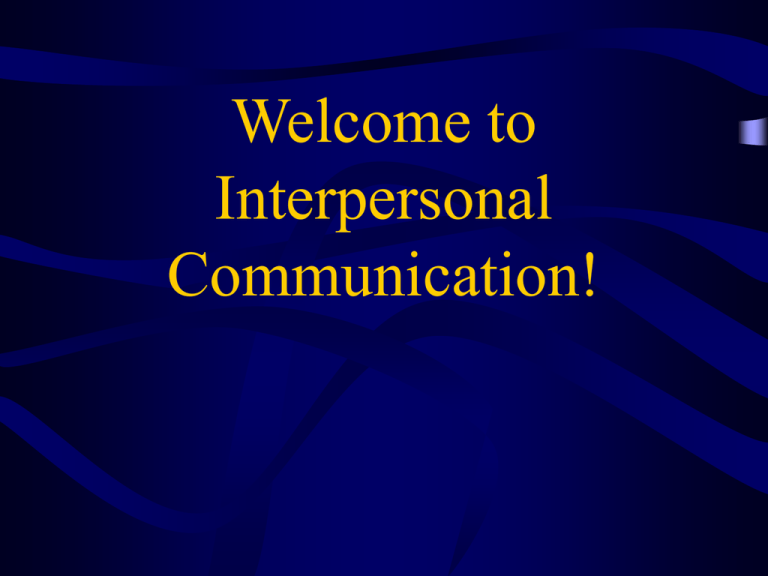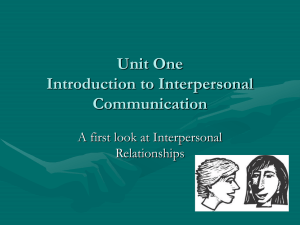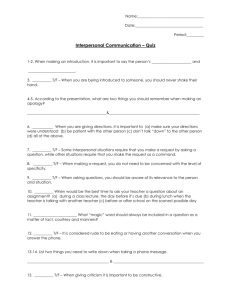Welcome to Interpersonal Communication!
advertisement

Welcome to Interpersonal Communication! Interpersonal Process Why Do We Communicate? • Physical Needs • Identity Needs • Social Needs • Practical Needs Or another way to look at this… • • • • • “Being all that we can be” Self respect, autonomy, achievement, status, recognition, attention affection, belonging, acceptance, friendship Security, protection from physical and emotional harm Hunger, thirst, shelter, warmth, etc. Interpersonal Process (continued) • The Communication Process • How we define “Interpersonal Communication” • Communication Principles and Misconceptions • Communication Competence The Communication Process The Linear View: Message Noise Sender encodes ideas and feelings into a message •External •Physiological •Psychological Receiver decodes the message The Communication Process The Interactive View: Sender sends message through behavior (verbal and nonverbal) Receiver decodes the message Message Feedback Sender decodes feedback Receiver sends feedback through behavior (verbal and nonverbal) The Communication Process The Transactional View: Messages & Feedback Communicator sends and receives messages, responds and decodes Communicator sends and receives messages, responds and decodes How we define “Interpersonal Communication” We can define interpersonal communication Quantitatively or Qualitatively The Quantitative Definition: “Interpersonal Communication includes any interaction between two people, usually face to face.” • Can be any two people • Occurs only between 2 people The Qualitative Definition: “Interpersonal Communication occurs when people treat one another as unique individuals, regardless of the context in which the interaction occurs or the number of people involved.” Opposite of interpersonal communication is impersonal communication, not group, public, or mass communication. -- Uniqueness -- Interdependence -- Irreplaceability -- Disclosure We can think of communication as lying on a continuum: Interpersonal Talking to your best friend about something that made you feel really embarrassed Half-listening to your significant other because you’re distracted thinking about a big test you have to take tomorrow Making small talk with a professor, talking about the latest Gator game Impersonal Ordering a cup of coffee from a cashier at Starbucks Communication Principles and Misconceptions (Laura’s amazing educational video) To recap in a slightly clearer version… • Communication Principles – – – – Communication can be intentional or unintentional Communication is irreversible All messages have a content and a relational dimension Communication is unrepeatable • Communication Misconceptions – – – – Not all communication seeks understanding More communication is not always better Communication will not solve all problems Effective communication is not a natural ability Communication Competence “Effective communication involves achieving one’s goals in a manner that, ideally, maintains or enhances the relationship in which it occurs.” • There is no “ideal” or “effective” way to communicate • Competence is situational • Competence can be learned How do you know when you have “arrived”? • • • • You make use of a large repertoire of skills You are adaptable You perform skillfully You are involved – – – – Care about the other person Care about what is being discussed Care about understanding/being understood Produce good results for you and the other person • ***You are empathetic *** • You demonstrate cognitive complexity • You self-monitor Performance But it’s still a matter of balance… Use of the competency characteristics • You can be so adaptable that you aren’t really being true to yourself… • You can be so involved that it’s intimidating or overwhelming… • You can self-monitor so much that you become overly self-conscious… • You can think about so many interpretations or approaches to take that you don’t ever act…



